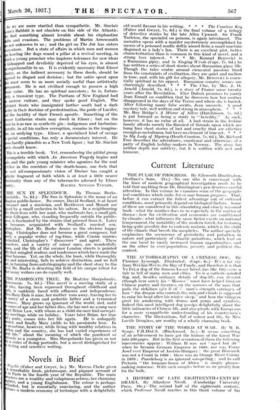Novels in Brief
P«pitee (Faber and Gwyer, 5s.) Mr. Marcus Cheke gives a remarkably fresh, picturesque; and piquant account of in Paris in the fourth year of the Republic. The main Meters are a.wealthy and voluptuous actress, her charming ghter, and a young Englishman. The colour is perhaps rloaded, but is essentially convincing, and the author
a 'bine% modern economy of technique with a delightfully
old-world flavour in his writing. * * * The Venetian Kee (Faber and Gwyer, 7s. 6d.) is the final volwue of a trilogy of detective stories by the late Allen Upward. Sir Frank Tarleton, the specialist on poisons, is again introduced. The narrative opens with a murder mysteriously accomplished by means of a poisoned needle deftly aimed from a small machine disguised as a lady's fan. There is an excellent plot, better characterization than is common in this kind of novel. and a strong love interest. * * * Mr. Konrad Bercovici is a Rumanian gipsy, and in Singing Winds (Cape, 75. lid.) he has written a series of short stories about Rumanian gipsy life. Though the tales centre around elemental passions freed from the constraints of civilization, they are quiet and mellow in tone, and, with his gift for allegory, Mr. Bercovici is essen- tially spiritual in his appeal. Rumanian country scenes are charmingly described. * * * The Clue, by Mrs. J. 0. Arnold (Arnold, 7s. 6d.), is a story of France some twenty years after the Revolution. Elise Dubois promises to marry Jean Enault on condition that he discovers how her mother disappeared in the days of the Terror and where she is buried. After following many false scents, Jean succeeds. A good mystery tale, well written and strong in atmosphere. * * * Mr. Roy Bridge's A Mirror of Silver (Hutchinson, 7s. 6d.) is put forward -as being a study in " heredity." As such, however, it has no value at all. A bad strain in the Irskine family affords merely the flimsiest of threads upon which are hung four short stories of lust and cruelty ,that are effective enough as melodrama, but have no element of true art. * *
In My Lady of Mystery (Heath Cranton, 7s. 6d.), Mr. Richard Free describes the adventures, emotional and otherwise. of a party of English holiday-makers in Norway. The story has
• neither depth nor subtlety, but it is written with zest and humour.






















































 Previous page
Previous page